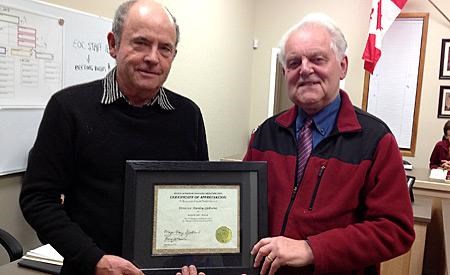Long-time Powell River Regional District (PRRD) board member, Stan Gisborne, was awarded a certificate at the November 28 regional board meeting commemorating his 25 years of service in local government.
Board chair Colin Palmer, in presenting the award, commented that he believed it was the longest anyone had ever served with a Powell River local government. The Union of BC Municipalities certificate of appreciation was granted to Gisborne to recognize his record of long and faithful service. His career spanned from inception in 1988, through to the present.
“It’s very rare,” Palmer said. “I can’t even remember anyone in Powell River who has served as long, so it’s a significant achievement and we all want to recognize the fact.”
Gisborne, who represents Electoral Area B, said he first became involved with local politics when the regional district planned a landfill in a watershed in Paradise Valley.
One of the many policies Gisborne had a hand in developing was a user-pay for waste disposal where tipping fees (fees paid per usage) were set to cover disposal costs. This made it so that there was some parity for users; before, people were taxed for the service whether they used it or not. “Previously,” Gisborne explained, “if we had to pay say $1,000,000 for waste disposal services, everyone would have to pay, even if you didn’t contribute any waste. Now people pay only when they use the service.” Another policy example is that a PRRD-Powell River Public Library service agreement was negotiated that contributes funds to the library on a population basis rather than on assessed value.
One of the major on-going issues that Gisborne said he is greatly concerned about is the continual downloading of federal and provincial services to the regional district, without any funding to go along with it. The PRRD now maintains docks on Savary and Texada islands. Another example is forcing the regional districts around the Salish Sea to implement riparian area regulations to protect fish habitat. This was imposed despite the fact that regional districts in other areas with much in common with Powell River did not have to do the same. “We asked, why not Port Alberni or Mount Waddington? There are more salmon spawning areas there than here? Ultimately we were forced to implement these riparian areas.”
When asked what is the one thing he would like to see happen in Powell River that the board has not yet been able to achieve, Gisborne replied that he would like to see a bicycle path plan developed. “This way, the PRRD can access 50 per cent of the cost to develop a network of bike lanes and paths from the ministry of transportation and infrastructure, up to $100,000,” Gisborne said.
Three of the most memorable events through the course of Gisborne’s 25 years in regional politics include a final waste disposal method with appropriate recycling.
Updated community plans that guide directors in their planning decisions, notably on Savary and in areas B and C south of town, is another highlight for Gisborne. As well, the regional district has started developing one for Area A, north of Powell River.
Finally, being able to widen part of Padgett Road for safer bicycle, pedestrian and animal traffic is another achievement Gisborne mentioned.
“The reason I stayed in Powell River was that I like living here,” said Gisborne. “One of the main reasons for this is that the restrictions here are quite a bit less than other areas. Here I can cut my own trees down on my property and build a house that I designed. You can’t do something like that in many places in BC. It’s one of the qualities here that I’d like to try and preserve.”



